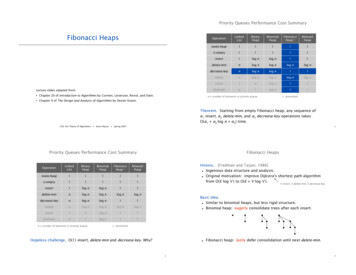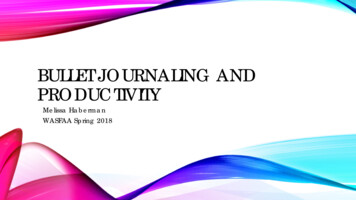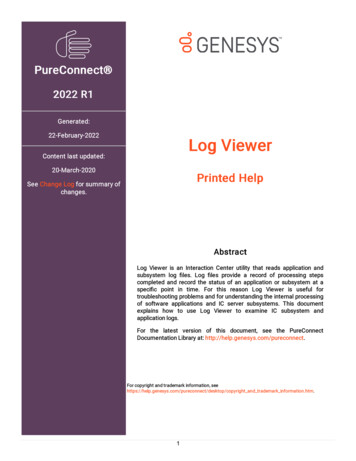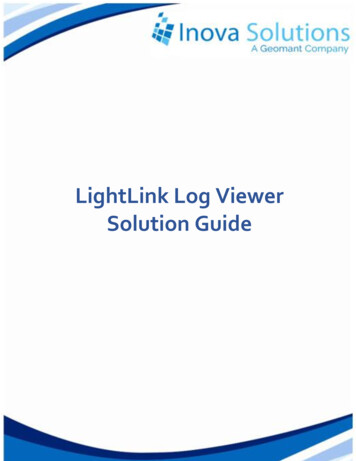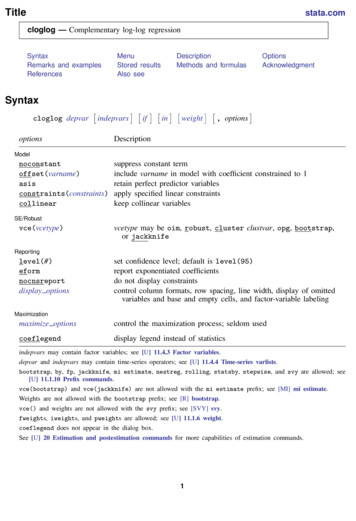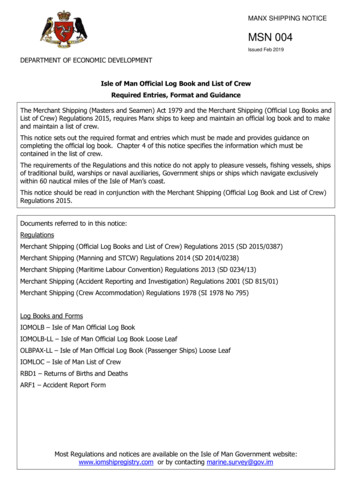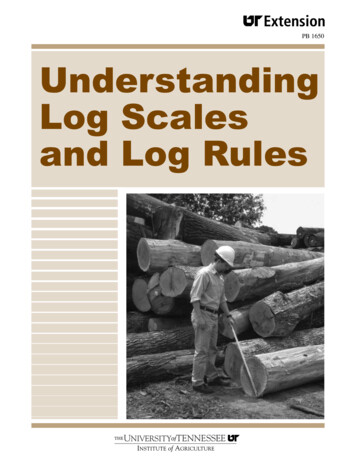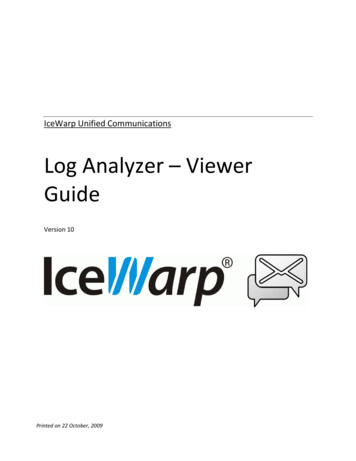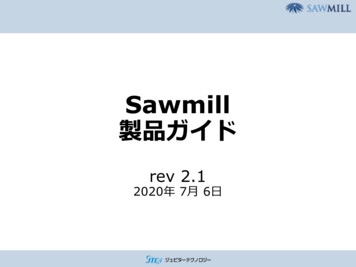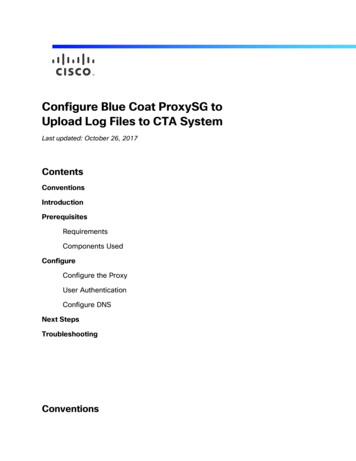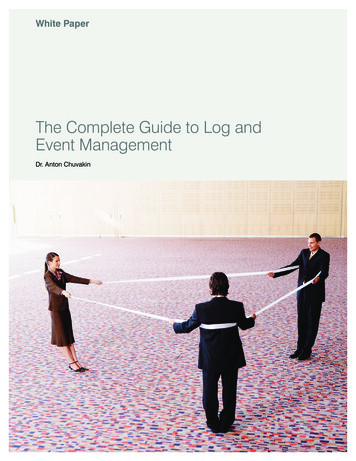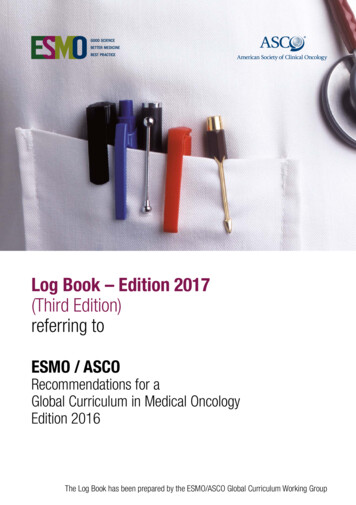
Transcription
Log Book – Edition 2017(Third Edition)referring toESMO / ASCORecommendations for aGlobal Curriculum in Medical OncologyEdition 2016The Log Book has been prepared by the ESMO/ASCO Global Curriculum Working Group
The Authors of the ESMO/ASCO Recommendations for a GlobalCurriculum in Medical Oncology - Edition 2016Christian Dittrich,1 Michael Kosty,2 Svetlana Jezdic,3 Doug Pyle,4 Rossana Berardi,5 JonasBergh,6 Nagi El-Saghir,7 Jean-Pierre Lotz,8 Pia Österlund,9 Nicholas Pavlidis,10 Gunta Purkalne,11Ahmad Awada,12 Susana Banerjee,13 Smita Bhatia,14 Jan Bogaerts,15 Jan Buckner,16 FatimaCardoso,17 Paolo Casali,18 Edward Chu,19 Julia Lee Close,20,21 Bertrand Coiffier,22 Roisin Connolly,23Sarah Coupland,24 Luigi De Petris,25 Maria De Santis,26 Elisabeth G E de Vries,27 Don S Dizon,28Jennifer Duff,29 Linda R Duska,30 Alexandru Eniu,31 Marc Ernstoff,32 Enriqueta Felip,33 Martin F Fey,34Jill Gilbert,35 Nicolas Girard,36 Andor W J M Glaudemans,37 Priya K Gopalan,38 Axel Grothey,39 StephenM Hahn,40 Diana Hanna,41 Christian Herold,42 Jørn Herrstedt,43 Krisztian Homicsko,44 Dennie V JonesJr,45,46 Lorenz Jost,47 Ulrich Keilholz,48 Saad Khan,49 Alexander Kiss,50 Claus-Henning Köhne,51 RainerKunstfeld,52 Heinz-Josef Lenz,53 Stuart Lichtman,54 Lisa Licitra,55 Thomas Lion,56,57 Saskia Litière,58Lifang Liu,59 Patrick J Loehrer,60 Merry Jennifer Markham,61 Ben Markman,62 Marius Mayerhoefer,63Johannes G Meran,64 Olivier Michielin,65 Elizabeth Charlotte Moser,66 Giannis Mountzios,67 TimothyMoynihan,68 Torsten Nielsen,69 Yuichiro Ohe,70 Kjell Öberg,71,72 Antonio Palumbo,73 Fedro AlessandroPeccatori,74 Michael Pfeilstöcker,75 Chandrajit Raut,76 Scot C Remick,77 Mark Robson,78 PiotrRutkowski,79 Roberto Salgado,80,81 Lidia Schapira,82 Eva Schernhammer,83 Martin Schlumberger,84Hans-Joachim Schmoll,85 Lowell Schnipper,86 Cristiana Sessa,87 Charles L Shapiro,88 Julie Steele,89Cora N Sternberg,90 Friedrich Stiefel,91 Florian Strasser,92 Roger Stupp,93 Richard Sullivan,94 JosepTabernero,95 Luzia Travado,96 Marcel Verheij,97 Emile Voest,98 Everett Vokes,99 Jamie Von Roenn,100Jeffrey S Weber,101 Hans Wildiers,102 Yosef Yarden103*For numbered affiliations see end of Log Book
ESMO/ASCO GLOBAL CURRICULUM WORKING GROUPChairChristian Dittrich, MD, Professor of MedicineHead of 3rd Medical Department—Centre for Oncology and Haematology, Kaiser Franz JosefSpital, Vienna, AustriaMembersAhmad Awada, MD, Professor of MedicineHead of Medical Oncology Clinic, Jules Bordet Institute, Brussels, BelgiumRossana Berardi, MD, Professor of Medical OncologyHead of Department of Medical Oncology, Università Politecnica delle Marche, Ospedali RiunitiAncona, Ancona, ItalyJonas Bergh, MD, PhD, FRCP (London, UK), Professor of Oncology (Mimi Althainz’ donation)Director, The Strategic Research Programme in Cancer, Karolinska Institutet and UniversityHospital, Stockholm, SwedenJulia Lee Close, MD, FACP, Associate ProfessorUF Department of Medicine, Division of Hematology/Oncology;Director, UF Hematology/Oncology, Fellowship Program; Assistant Chief, Medical Service,Malcom Randall VA Medical Center, Gainesville, Florida, USATanja Čufer, MD, PhD, Professor of OncologyUniversity Clinic Golnik, Medical Faculty Ljubljana, Golnik, SloveniaNagi El-Saghir, MD, FACP, Professor of Clinical MedicineDepartment of Internal Medicine, NK Basile Cancer Institute, American University of Beirut MedicalCenter, Beirut, LebanonMichael Kosty, MD, FACP, FASCODirector, Scripps Green Cancer Center, Division of Hematology/Oncology, Scripps Clinic, La Jolla,California, USAJean-Pierre Lotz, MD, ProfessorHead of the Department of Medical Oncology and Cellular Therapy, Medical Oncology Department,Tenon Assistance Publique—Hôpitaux de Paris, Paris, FrancePia Österlund, MD, PhD, DocentDepartment of Oncology, HUCH Helsinki University Central Hospital, Helsinki, Finland and Clinicum,University of Helsinki, Helsinki, FinlandNicholas Pavlidis, MD, PhD, FRCP Edin(Hon), Emeritus Professor of Medical OncologyUniversity of Ioannina, Ioannina, GreecePiotr Rutkowski, MD, PhD, Professor of Surgical OncologyMaria Sklodowska-Curie, Memorial Cancer Center and Institute of Oncology; Head of Departmentof Soft Tissue/Bone Sarcoma and Melanoma, Warsaw, PolandArafat Tfayli, MD, Professor of Clinical MedicineDirector, Hematology/Oncology Fellowship Training Program, American University of Beirut MedicalCenter, Beirut, Lebanon
Ex Officio:Svetlana Jezdic, MD, MScStaff Medical Oncologist, Medical Affairs, European Society for Medical Oncology (ESMO), Lugano,SwitzerlandDoug Pyle, MBAVice President, International Affairs, American Society of Clinical Oncology (ASCO), Alexandria,Virginia, USAEditorial Board of the 2016 Edition of the Global CurriculumJonas Bergh, MD, PhD, FRCP (London, UK), Professor of Oncology (Mimi Althainz’ donation)Director, The Strategic Research Programme in Cancer, Karolinska Institutet and UniversityHospital, Stockholm, SwedenHetty Carraway, MD, Associate ProfessorDirector of Hematology/Oncology Fellowship Program, Physician, Department of HematologyOncology, Cleveland Clinic, Cleveland, Ohio, USAJulia Lee Close, MD, FACP, Assistant ProfessorUF Department of Medicine Division of Hematology/Oncology; Director, UF Hematology/OncologyFellowship Program; Assistant Chief, Medical Service, Malcom Randall VA Medical Center,Gainesville, Florida, USAChristian Dittrich, MD, Professor of MedicineHead of 3rd Medical Department—Centre for Oncology and Haematology, Kaiser Franz JosefSpital, Vienna, AustriaJill Gilbert, MD, Associate Professor of MedicineVanderbilt University School of Medicine, Nashville, Tennessee, USAMichael Kosty, MD, FACP, FASCODirector, Scripps Green Cancer Center, Division of Hematology/Oncology, Scripps Clinic, La Jolla,California, USAGunta Purkalne, MD, Associate ProfessorClinic of Oncology, Pauls Stradins Clinical University Hospital, Riga, Latvia
Review Board of the 2016 Edition of the Global CurriculumCarsten Bokemeyer, MD, PhD, Professor of MedicineDirector of the Department, Oncology, Hematology and BMT with Section Pneumology, UniversityMedical Centre, Universitaetsklinik Hamburg, Hamburg, GermanyAndrés Cervantes, MD, PhD, Professor of MedicineHead of Department, Medical Oncology Department, Biomedical Research Institute INCLIVA,University of Valencia, Valencia, SpainJulia Lee Close, MD, FACP, Assistant ProfessorUF Department of Medicine Division of Hematology/Oncology; Director, UF Hematology/OncologyFellowship Program; Assistant Chief, Medical Service, Malcom Randall VA Medical Center,Gainesville, Florida, USAChristian Dittrich, MD, Professor of MedicineHead of 3rd Medical Department—Centre for Oncology and Haematology, Kaiser Franz JosefSpital, Vienna, AustriaNagi El-Saghir, MD, FACP, Professor of Clinical MedicineDepartment of Internal Medicine, NK Basile Cancer Institute, American University of Beirut MedicalCenter, Beirut, LebanonJill Gilbert, MD, Associate Professor of MedicineVanderbilt University School of Medicine, Nashville, Tennessee, USAMichael Kosty, MD, FACP, FASCODirector, Scripps Green Cancer Center, Division of Hematology/Oncology, Scripps Clinic, La Jolla,California, USAYuichiro Ohe, MD, PhDDeputy Director of the Hospital, Chief, Department of Thoracic Oncology, National Cancer CenterHospital, Tokyo, JapanMiklos Pless, MD, ProfessorHead of Medical Oncology, Kantonsspital Winterthur, Winterthur, Switzerland
TABLE OF CONTENTS1 INTRODUCTIONReferences15172 STANDARD REQUIREMENTS FOR TRAINING IN MEDICAL ONCOLOGY183 SPECIAL REQUIREMENTS3.1 Programme Leader/Director of Medical Oncology Training Programme3.2 Faculty3.2.1 Faculty members3.2.2 Faculty standards3.3 Educational Programme3.3.1 Educational environment3.3.2 Professionalism3.3.3 Responsibility3.3.4 Update of skills and knowledge3.3.5 Perception of other specialties3.3.6 Institutional requirements3.3.6.a Clinical setting3.3.6.b Hospital facilities3.3.7 Facilities1919191919192020202020202020214 COMPETENCIES REQUIRED IN THE CURRICULUM4.1 Basic Scientific Principles4.1.1 Cancer biology4.1.2 Tumour immunology4.1.3 Aetiology, epidemiology, screening and prevention4.1.4 Clinical research4.1.5 Statistics4.2 Basic Principles in the Management and Treatment of Malignant Diseases4.2.1 Pathology4.2.2 Molecular pathology4.2.3 Laboratory medicine2222232528303335353843
4.2.4 Translational research4.2.5 Principles of personalised cancer medicine4.2.6 Staging procedures (clinical staging)4.2.7 Imaging4.2.8 Molecular imaging4.2.9 RECIST4.3 Therapy4.3.1 Surgical oncology4.3.2 Radiation oncology4.3.3 Anticancer agents4.3.4 Biological therapy4.3.5 Immunotherapy4.3.6 Complications/Toxicities of treatment4.4 Supportive and Palliative Care4.4.1 Supportive measures4.4.2 Palliative care4.4.3 End-of-life care4.5 Management and Treatment of Specific Cancers4.5.1 Head and neck cancers4.5.2 Thoracic malignancies4.5.2.a Small-cell lung cancer4.5.2.b Non-small-cell lung cancer4.5.2.c Mesothelioma4.5.2.d Thymoma and thymic cancer4.5.3 Gastrointestinal cancers4.5.3.a Oesophageal cancer4.5.3.b Gastric cancer4.5.3.c Colon and rectal cancer4.5.3.d Anal cancer4.5.3.e Hepatobiliary cancers4.5.3.f Pancreatic adenocarcinoma4.5.4 Genitourinary cancers4.5.4.a Renal cell cancer4.5.4.b Urothelial 101104106106109112115118121124124126
4.5.4.c Penile cancer4.5.4.d Prostate cancer4.5.4.e Germ cell tumours4.5.5 Gynaecological malignancies4.5.5.a Ovarian cancer (including fallopian tube and primary peritoneal cancer)4.5.5.b Endometrial cancer4.5.5.c Cervical cancer4.5.5.d Vulvar and vaginal cancers4.5.5.e Gestational trophoblastic neoplasia4.5.6 Breast cancer4.5.7 Sarcomas4.5.7.a Bone sarcomas4.5.7.b Soft tissue sarcomas4.5.7.c Gastrointestinal stromal tumour4.5.8 Skin cancers4.5.8.a Melanoma4.5.8.b Basal cell and squamous cell cancers of the skin4.5.9 Endocrine tumours4.5.9.a Thyroid cancer4.5.9.b Neuroendocrine neoplasms4.5.10 Central nervous system malignancies4.5.11 Carcinoma of unknown primary site4.5.12 Haematological malignancies4.5.12.a Leukaemias (including acute andchronic leukaemias of lymphoid and myeloid lineage)4.5.12.b Lymphomas4.5.12.b.1 Hodgkin’s lymphoma4.5.12.b.2 Non-Hodgkin’s lymphoma4.5.12.c Plasma cell dyscrasias4.5.12.d Myeloproliferative neoplasms4.6 Rare Cancers4.7 AIDS-Associated Malignancies4.8 Special Issues in the Diagnosis and Treatment of Cancers in Adolescents4.9 Special Issues in the Diagnosis and Treatment of Cancers in Young 94196
4.10 Cancer and Pregnancy4.11 Geriatric Oncology4.12 Cancer Treatment in Patients with Comorbidities1982012045 PSYCHOSOCIAL ASPECTS OF CANCER2076 COMMUNICATION2107 GENETIC COUNSELLING2128 PATIENT EDUCATION2149 SURVIVORSHIP21710 BIOETHICAL, LEGAL AND ECONOMIC ISSUES10.1 Bioethical and Legal Issues10.2 Economic Issues of New Cancer Drugs22122122311 CANCER CARE DELIVERY IN LOW-RESOURCE ENVIRONMENTS22612 SKILLS228Notes231Author affiliationsAcknowledgementDisclosures of potential conflicts of interest235239239
1 INTRODUCTIONChristian DittrichMichael KostyDeep insight into tumour biology from carcinogenesis to occurrence of drug resistance, thedevelopment of modern diagnostic tools and measures like molecular imaging and moleculargenetics and the change in the discovery and development of increasingly more rational, preciseor personalised medicines highlight the imperative for corresponding excellence in the training ofmedical oncologists. It is the intention of the European Society for Medical Oncology (ESMO) andof the American Society of Clinical Oncology (ASCO) to reach the goal of insuring that patientsworldwide have an equal chance of receiving treatment and cancer care from well-trainedphysicians. The mobility of todays’ population of patients and physicians makes it necessary tooffer harmonised state-of-the-art cancer care everywhere.This unprecedented progress in medical oncology has made it necessary to create a newversion of the Global Curriculum – the Edition 2016.1,2,3 Based on the inaugural 2004 edition thatwas updated in 2010, this third edition comprises multiple changes and innovations in terms ofcontent, such as:· Targeted therapies are integrated into the (sub)chapters of the separate tumour entitieswherever suitable;· Immunotherapy is presented in a new separate chapter to reflect its clinical impact;· Biological therapy and immunotherapy are now presented in separate chapters;· Pathology, molecular pathology, laboratory medicine, translational research, and principlesof personalised cancer medicine have been transformed into separate chapters due to theirimportance;· Tumour immunology has been separated into “tumour immunology” which was kept under“basic scientific principles”, and into “immunotherapy” which was shifted as separate chapterto the subsection “therapy”;· Imaging and molecular imaging have been separated into two chapters and are followed bythe additional chapter on “RECIST”;· Rare cancers have been established as a novel subsection;· Cancer treatment in patients with comorbidities is treated in a new subsection;· Genetic counselling is given increased attention due to its increasing relevance in patientmanagement as a separate section;· Survivorship with its tremendously increasing impact is presented in a separate section.There exist general principles, which are of importance for many, if not most disease states,therefore, separate (sub)sections have been dedicated to them:· Integration of palliative or supportive care measures· Consideration of psychosocial aspects· Consideration of adequate communication· Provision of ethical, legal or economic issues15Log Book 2017 (third edition) referring to ESMO/ASCO Recommendations for a Global Curriculum in Medical Oncology - Edition 2016
The other main reason for the new edition of the Global Curriculum (GC) was to restructure itaccording to modern didactic principles. Thus, a template-based framework is used. The quality ofthe outcome requirements of detailed learning objectives has been subcategorised into awareness,knowledge, and skills, wherever appropriate. The following definitions were applied:AwarenessKnowledgeSkillsBasic level of information; state of being informed or conscious of a factor situationElevated/high level of information; understanding or familiarity of a fact orsituation gained by experience; body of facts learned by study or experience; understanding and information gained from being educatedAbility to do something well especially because of practice; expertise; ability in executing somethingThis Log Book reflects completely the GC Edition 20162 and is a tool to allow the assessmentof both the actual training situation and its progress. Ideally, the boxes (yes/no) are ticked both atthe start of the training and at its termination. The Log Book intentionally allows only a categoricaldistinction between yes and no.CurriculumTraineeEducation programme for traineesJunior specialist in medical oncology after or in parallel with internalmedicine training; a trainee could have several mentors during his/hereducationMentorRecognised/confirmed medical oncologist who personally educates, supervises, and guides a traineeHead ofPerson who is responsible for the medical oncology infrastructure andDepartment/who guarantees the mentor’s competence and the accuracy of the conInstitution/Division tents of the Log Book documentor TrainingProgrammeDirectorAt the beginning and end of the training period, the mentor should fill in the box corresponding tothe trainee’s current assessment. A working version could be used during the training. The signaturepage should contain signatures by the mentor(s), and the person in charge of the training centre (e.g.head of department, or equivalent) with full address and contact information as well as the signatureof the trainee. The mentor specifies the (sub)sections/(sub)chapters he/she supervised.16Log Book 2017 (third edition) referring to ESMO/ASCO Recommendations for a Global Curriculum in Medical Oncology - Edition 2016
An interactive version of the Log Book can be downloaded from the ESMO or ASCO Website4,5 or aprinted version can be obtained by contacting either the ESMO or ASCO Head Office.As the 2016 version of the Global Curriculum and the 2017 edition of the Log Book are used, wewelcome any comments or suggestions you might have. These may be forwarded to education@esmo.org.References1. Dittrich C, Kosty M, Jezdic S, et al. ESMO / ASCO Recommendations for a Global Curriculum(GC) in Medical Oncology – Edition 2016 (Editorial). Ann Oncol 2016;27:1378–1381. DOI:10.1093/annonc/mdw239.2. Dittrich C, Kosty M, Jezdic S, et al. ESMO / ASCO Recommendations for a Global Curriculum inMedical Oncology - Edition 2016. ESMO Open 2016;1:e000097,1-96.DOI: 10.1136/esmoopen-2016-000097.3. Dittrich C, Kosty M, Jezdic S, et al. Global Curriculum Edition 2016: European Society forMedical Oncology/American Society of Clinical Oncology Recommendations for Trainingin Medical Oncology (Correspondence). J Clin Oncol 2017;35:254-255. DOI:10.1200/JCO.2016.70.2431.4. ESMO/ASCO Recommendations for a Global Curriculum in Medical Oncology, Log Book, thirdedition, 017/5. ESMO/ASCO Recommendations for a Global Curriculum in Medical Oncology, Log Book, thirdedition, s/2017-ESMO-ASCO-Log-Book-interactive.pdf17Log Book 2017 (third edition) referring to ESMO/ASCO Recommendations for a Global Curriculum in Medical Oncology - Edition 2016
2 STANDARD REQUIREMENTS FOR TRAINING IN MEDICAL ONCOLOGYMichael Kostyon behalf of the ESMO/ASCO GC Working GroupThe standard requirement is for a total training period of at least 5 years, beginning with trainingin internal medicine for 2–3 years, followed by a training programme in medical oncology for aminimum of 2–3 years.The training programme in medical oncology must include full-time clinical training in thediagnosis and management of a broad spectrum of neoplastic diseases comprising solid tumoursand haematological malignancies. Trainees should have access to a wide variety of general andspecialty consultative support, including general surgery and surgical subspecialties, internalmedicine and its subspecialties, as well as pathology, laboratory medicine, diagnostic andtherapeutic radiology, psychiatry, neurology, physiotherapy and nutrition.Full-time clinical training means that the trainee’s professional time and effort during a standardworking week is dedicated to clinical activities (patient care or education). These may include theprimary care of patients with cancer, supervision of patients with cancer on the general medicalservice or in designated medical oncology inpatient units, oncological consultations and consultationrounds, oncology ambulatory and day unit care, scheduled clinical conferences, performance ofprocedures on patients, review of imaging, pathology and other diagnostic materials, other directpatient care, attending national and international scientific meetings and reading relevant literature.There should be multidisciplinary tumour conferences held on a regular basis, and trainees shouldbe active participants in these conferences.Clinical activities may also include research involving patient contact, care and treatment.Research activities of a maximum of 6 months may be counted for the total training period of atleast 5 years. Research experience of longer duration, including international training, is stronglyrecommended, especially for oncologists who want to pursue an academic career.18Log Book 2017 (third edition) referring to ESMO/ASCO Recommendations for a Global Curriculum in Medical Oncology - Edition 2016
3 SPECIAL REQUIREMENTSNagi El-SaghirJean-Pierre Lotzon behalf of the ESMO/ASCO GC Working Group3.1 Programme Leader/Director of Medical Oncology Training ProgrammeThe Medical Oncology Programme Leader (or Director of Medical Oncology Training Programme)must be qualified to supervise and educate trainees in medical oncology. Thus, the leader mustbe certified in medical oncology or possess equivalent qualifications. The leader will have a majorcommitment to the training programme and related activities, and must be based at the primarytraining site of the medical oncology programme. The trainee will maintain a record of his/hertraining. The programme leader will countersign it, as appropriate, to confirm the satisfactoryfulfilment of the required training experience and the acquisition of the competencies that are gainedin the specialty curriculum. The record will remain the property of the trainee and must be signedat the annual reviews by the responsible programme leader/director of medical oncology trainingprogramme.3.2 Faculty3.2.1 Faculty membersThe medical oncology programme faculty must include a minimum of three full-time, qualifiedteaching faculty members, including the programme leader. All the faculty members must becertified in medical oncology or possess equivalent qualifications and each of them must devotesubstantial time (at least 10 hours per week) to clinical rounds, teaching and research, with thetrainees as well as to the critical evaluation of the performance, progress and competence of thetrainees.3.2.2 Faculty standardsThe teaching staff must demonstrate an interest in teaching, and set an example for traineesby documented engagement in the following pursuits: actively sharing the personal experience ofworking in a medical oncology clinical practice and multidisciplinary team; continuing his/her ownmedical education; active membership in regional, national and international scientific societies;ideally active participation in research and presentation and publication of scientific studies.3.3 Educational ProgrammeThe educational programme in medical oncology must be organised to provide training andexperience at a level high enough for the trainee to acquire the competency of a specialist in thefield. The programme must emphasise scholarship, self-instruction, development of critical analysisof clinical problems and the ability to make appropriate decisions, in addition to active involvementin regularly scheduled conferences and multidisciplinary clinics and/or tumour boards. Appropriatesupervision of the trainees must be provided for the duration of their educational experience.The programme should foster all aspects of the roles required of an oncologist, including beingan effective communicator with patients, a collaborator in the treatment team, a manager of the19Log Book 2017 (third edition) referring to ESMO/ASCO Recommendations for a Global Curriculum in Medical Oncology - Edition 2016
healthcare system, a health advocate not just for the patient but for the community and a scholarwith lifelong commitment and high professional ethics and standards. The following principlesrequire special emphasis:3.3.1 Educational environmentMedical oncology training programmes must provide an intellectual environment for acquisition ofthe knowledge, skills, clinical judgement and attitudes essential to the practice of medical oncologyin the context of multidisciplinary care. This objective can only be achieved when appropriateresources and facilities are available. Service commitments must not compromise the achievementof educational goals and objectives.3.3.2 ProfessionalismProfessionalism must be fostered during medical oncology training. In addition to masteringthe comprehensive clinical and technical skills of the consultant medical oncologist, trainees areencouraged to participate in the educational activities of professional organisations, communityprogrammes and institutional committees.3.3.3 ResponsibilityLines of responsibility must be clearly delineated for the trainees in medical oncology.3.3.4 Update of skills and knowledgeHaving obtained certification in medical oncology, the specialist is expected to update the acquiredskills and knowledge by participating in Continuing Medical Education programmes such as courses,symposia or self-learning processes on a regular basis.3.3.5 Perception of other specialtiesIt is also essential to have the support of oncology nursing, pharmacy, emergency medicine,intensive care, rehabilitation medicine, palliative care medicine, and dietetic and psychosocialservices so that the trainee can perceive the role of other specialties in the total care of the patientwith cancer.3.3.6 Institutional requirements3.3.6.a Clinical settingThe clinical setting must include opportunities to observe and manage patients with a widevariety of neoplastic diseases on an inpatient and outpatient basis. The trainee must be given theopportunity to assume the continuing responsibility for acute and chronically ill patients in orderto learn the natural history of cancer, the extent of the effectiveness of the various therapeuticprogrammes and how to impart information to the patient, including bad news. The scenario shouldinclude everything from prevention, treatment, to the long-term follow-up of patients with cancer.3.3.6.b Hospital facilitiesModern inpatient, ambulatory care and laboratory facilities necessary for the overall educational20Log Book 2017 (third edition) referring to ESMO/ASCO Recommendations for a Global Curriculum in Medical Oncology - Edition 2016
programme must be available and functioning. Specifically, at the primary site, there must beadequate pathology services, modern diagnostic radiology services, resources for nuclear medicineimaging, blood banking and blood therapy facilities and facilities for clinical pharmacology andtumour immunology/biology. A general surgical service and its support must be available, in additionto access to radiation therapy. The programme must also include a set-up for multidisciplinarytumour conferences, and preferably participation in clinical trials according to guidelines on goodclinical practice (GCP).3.3.7 FacilitiesIt is the responsibility of the teaching institute to oversee that these facilities are available before agraduate medical education programme is initiated.21Log Book 2017 (third edition) referring to ESMO/ASCO Recommendations for a Global Curriculum in Medical Oncology - Edition 2016
4 COMPETENCIES REQUIRED IN THE CURRICULUMJulia Lee CloseMichael KostyJill GilbertThe curriculum should be considered as the educational framework for the training of physiciansin medical oncology. The current version represents an expansion of each topic to now include morespecific details on curricular content. Each topic is divided into four areas: Objectives, Awareness,Knowledge and Skills. The ‘Objectives’ section provides an overview of the scope of knowledge atrainee is expected to master in the topic. ‘Awareness’ defines components integral to the topic.‘Knowledge’ provides a listing of concepts necessary to practice. ‘Skills’ provides the activitiesincluded in practicing oncology in the specific area covered.4.1 Basic Scientific PrinciplesAhmad AwadaAs a foundation for managing and treating malignant disease, the trainee should learn andunderstand the following:1. The hallmarks of cancer including the complexity of cancer cell biology and the interaction with thetumour microenvironment (immune system, etc);2. The management and treatment of malignant diseases (by organ and/or by biological subtypes);3. Specific systemic anticancer therapies (cytotoxics/cytostatics, (anti)hormones, biological agents(interferon, IL-2), targeted agents (small molecules) and immunotherapeutics (monoclonalantibodies));4. Supportive measures in relation to all kinds of systemic anticancer therapies;5. Palliative measures including end-of-life care;6. How to properly conduct and participate in translational and clinical research.It should be noted that the management and treatment of malignant diseases are continuouslyevolving fields, in view of the advances in molecular biology and imaging techniques. In addition,a multidisciplinary approach to malignant diseases is the basis for optimal quality of patient care.22Log Book 2017 (third edition) referring to ESMO/ASCO Recommendations for a Global Curriculum in Medical Oncology - Edition 2016
4.1.1 Cancer biologyYosef YardenObjectives· To be able to critically consider and clinically apply newly proposed and existing modelsreferring to molecular/cellular mechanisms of disease, modes of action of specific drugs,significance of biomarkers, as well as potential bases of adverse effects and acquiredresistance to specific treatmentsStartEndMastering of the items below as of the training’sYes No Yes NoAwareness Awareness of the organisation of biological systems in multi component networks and availability of signal transduction pathways and protein–protein interaction maps linking protein complexes to specific functions of cancer cellsAwareness of the availability of high-resolution maps and nucleotide sequences of all human chromosomes, including epigenetic marksand genomic aberrations prevalent in various types of tumoursAwareness of the availability of custom, high-throughput analyses of full exome sequences able to identify putative driver mutationsin solid or liquid specimensAwareness of the availability of mouse models of many driver mutations, including some combinations of oncogenic mutationsAwareness of accessible technologies permitting establishment of in vitro cultures, as well as tumour implants derived frompatient specimens and available for screening of individual drugsor drug combinationsRecognition of the importance of liquid biopsies as sources of early indicators of relapse and emergence of new mutationsKnowledge Familiarity with mechanisms underlying stepw
Director, Scripps Green Cancer Center, Division of Hematology/Oncology, Scripps Clinic, La Jolla, California, USA Gunta Purkalne, MD, Associate Professor Clinic of Oncology, Pauls Stradins Clinical University Hospital, Riga, Latvia. Review Board of the 2016 Edition of the Global Curriculum
